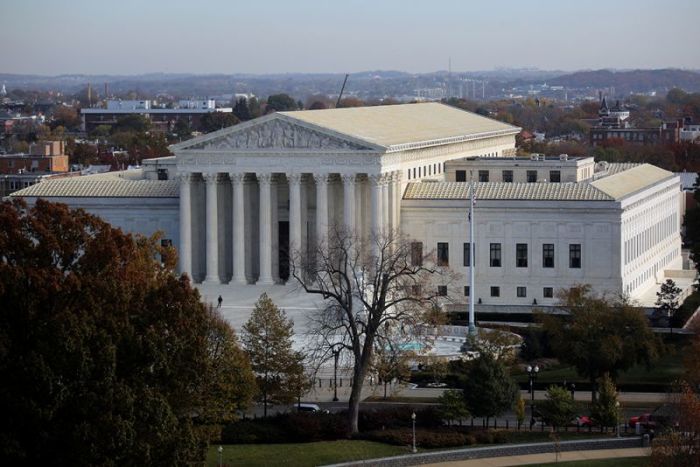Supreme Court decision prevents Texas hospital from removing toddler Tinslee Lewis' life support

The U.S. Supreme Court has declined an appeal from a Texas hospital seeking to overturn a lower court decision that prevented it from removing a baby girl’s life support.
The case of Cook Children’s Medical Center v. Tinslee Lewis, et al. was one of several cases that the Supreme Court declined to hear Monday. The court’s refusal to hear the case leaves the lower court ruling temporarily preventing the Fort Worth, Texas-based Cook Children’s Medical Center from withdrawing life support from 23-month old Tinslee Lewis.
Lewis’ mother has spent more than a year fighting to keep her daughter alive. In November 2019, Cook Children’s Medical Center attempted to invoke the 10-Day Rule against Lewis, who was born prematurely and with a heart defect. The Texas Advance Directives Act, or 10-Day Rule has been described by the pro-life group Live Action as an “unethical and institutional power play” that “allows families just 10 days to find a new hospital for their family members on life support after the hospital they are currently using decides to remove life support.”
The 10-Day Rule requires hospitals to give families 10 days’ notice before ending life-sustaining treatment for patients suffering from a terminal illness or who doctors believe have little or no chance of survival. With approval from a medical or ethics committee, doctors are allowed to end treatment in these cases.
Once a hospital has decided to discontinue treatment, families are given 10 days to find a different hospital that is willing to admit their loved one.
If families are unable to find a hospital and transfer the patient by the 10th day, all treatments are withdrawn unless a judge intervenes with a court order requiring the hospital to continue life-sustaining treatment.
“T.L.’s life has value,” lawyers for Tinslee Lewis and her mother explained in a brief to the Supreme Court. “Withdrawal of life-saving treatment would kill T.L., who has normal brain function, interacts with Mother, and experiences joy from living. Mother acknowledges that certain medical procedures, such as IV insertions, can cause T.L. pain, but T.L. is not in agony.”
“Petitioner states that it made a moral decision that treatment ‘inflicts pain and fear on a sedated child for no benefit,” they added. “The moral decision that there is no benefit in T.L.’s life is not Petitioner’s to make. That decision belongs to her Mother and her Creator.”
Lewis’ lawyers explained that they had called on the appellate court to issue a temporary injunction, maintaining that such a step was necessary to “give state courts the opportunity to assess the constitutionality of Texas Health and Safety Code section 166.046 through a trial on the merits.”
According to the brief filed on behalf of Lewis’ family, that particular provision of Texas law “allows hospitals to end patients’ lives without allowing them notice and opportunity to be heard on the value of their life.”
In a reply brief submitted to the Supreme Court, attorneys for Cook Children’s Medical Center argued: “This case involves a private hospital providing private medical care to a private patient; there is no state input, participation, or control of any kind.”
Additionally, they wrote, the Lewis family's inability to find an alternative hospital to provide her with care “indicates the deep moral, ethical, and medical problems with respondents’ proposed course of painful treatment for a terminally ill child.”
Attorneys for Lewis’ family also dispute the notion that the case does not involve any state action, alleging that “defining the lawful means of death and dying is state action.” Additionally, they called for the Supreme Court to reject Cook Children’s Medical Center’s appeal, claiming that it did not have jurisdiction to hear a case that deals entirely with state law.
According to the pro-life group Texas Right to Life, “the case will now return to the lower court for final adjudication on the merits.” Texas Right to Life contends that the lower court trial will enable a judge to decide if “the rights of baby Tinslee are being violated,” whether a hospital should have “unilateral authority to withdraw life-sustaining medical treatment from a patient against the will of the patient/surrogate,” and if “patients have any due process rights in these situations” and the constitutionality of the 10-Day Rule.
Should the district court rule in favor of Lewis, not only would Cook Children’s Medical Center be permanently prohibited from removing her life support, all hospitals in Texas would no longer have the ability to use the 10-Day Rule to “hasten patients’ deaths.”
The 10-Day Rule law was passed by the Texas Legislature in 1999 and signed by then-Gov. George W. Bush “as a compromise between the medical community and pro-life and disability rights groups,” The Houston Law Review journal notes.
“The consensus at the time of passage did not last long because pro-life and disability rights groups grew concerned with how doctors and hospitals implemented the statute’s procedures. It became clear that the statute provided doctors with absolute immunity yet provided only ‘very weak procedural protections for patients’,” the journal adds.
Since then, the journal notes that the Texas Legislature has considered over 25 bills aimed at amending the law, but have enacted only two.





























